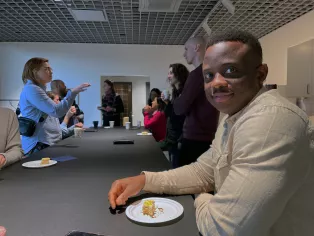Together, the newly admitted PhD students have knowledge and experience from large parts of the world, from Mexico via Bangladesh to West Africa.
– I was recommended by some who are already connected to SWEAH to also join. It is valuable to learn more about the theories and meet more people in the research field, says Franziska Steffens, PhD student at Karolinska Institutet.
|
|
|
For Ana Sabsil López Rocha, also from KI, it was an interesting SWEAH course there on inequalities in ageing that made her applying to the graduate school.
– That's how I first discovered SWEAH. Now of course I also want to network, I want to learn from everyone, professors and PhD students and their various research projects. So that I can find my research path, she says.
– Being in this research environment gives me resources that I can benefit from. It was the courses that made me apply, but it will also be fun to make contacts with other PhD students, says doctoral student Landry Botokou, Linköping University.
Their research themes are widely different, from neuroscience to social work, but all have the common denominator of ageing and health.
The advantages are many, but it can also be a challenge, both for SWEAH to arrange, and for the PhD student to participate in a national graduate school in addition to the regular doctoral education. It should not clash with the graduate school's courses, but that the PhD students receive a further developing supplement.
– It is important to complete your mandatory courses. Sometimes we are contacted, it is important that we have transparent communication with the home university, says SWEAH's coordinator Susanne Iwarsson.
She and SWEAH's study coordinator, Steven Schmidt, also reminded how important it is to know what interdisciplinary research, which SWEAH PhD students will conduct and which is requested by grantors, really means - and the terminology of the research, already now at the beginning of the career. There is much to learn from fellow students.
– Your own terminology will be challenged. Who is older and what is ageing? You will notice that it occurs at different ages depending on the discipline and context, says Steven Schmidt.
For example, solely studying the illness of older people is not ageing research, if it is not studied with the connection of ageing and health.
A total of 14 PhD students applied for affiliation 2025 and 11 were accepted in this 12th round at SWEAH;
| Name | Project title | Home university |
| Helena Bjurbäck | Governance at the intersection of stakeholders and the management of social problems and exclusion | Linköping University |
| Stina Larsson | Ageing and how that may affect today´s and tomorrow´s solutions for mobility | Linköping University |
| Monika Larsson | Municipal Senior Centres in Sweden | Lund University |
| Julia Hallin | Development and evaluation of fall preventive motor- cognitive exercise programme among community dwelling older adults | Umeå University |
| Franziska Steffens | Old-age depression: Temporal and regional differences and their implications for treatment and healthcare utilization patterns in old age. | Karolinska Institutet |
| Martin Nilsson | Quantifying Hippocampal Neurogenesis in the Living Human Brain and its Relevance for Long-Term Memory | Karolinska Institutet |
| Farzana Rahman | How can the structure and quality of health and social care for older people with complex care needs in Sweden be improved? | Karolinska Institutet |
| Mattias Antar | Municipal care and services for people living with dementia in ordinary housing – A study of quality and differences between Swedish municipalities | Linköping University |
| Anna Bergman | The significance of playfulness and play for health and well-being among older persons with reduced mobility | Kristianstad University |
| Ana Sabsil López Rocha | Blood-based biomarkers for precision prevention of dementia through multidomain interventions: findings from the FINGER study | Karolinska Institutet |
| Landry Batokou | Exploring the Role of Sectoral Factors for Late Working Life Inequalities in Europe. | Linköping University |





